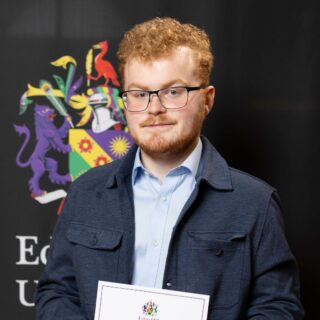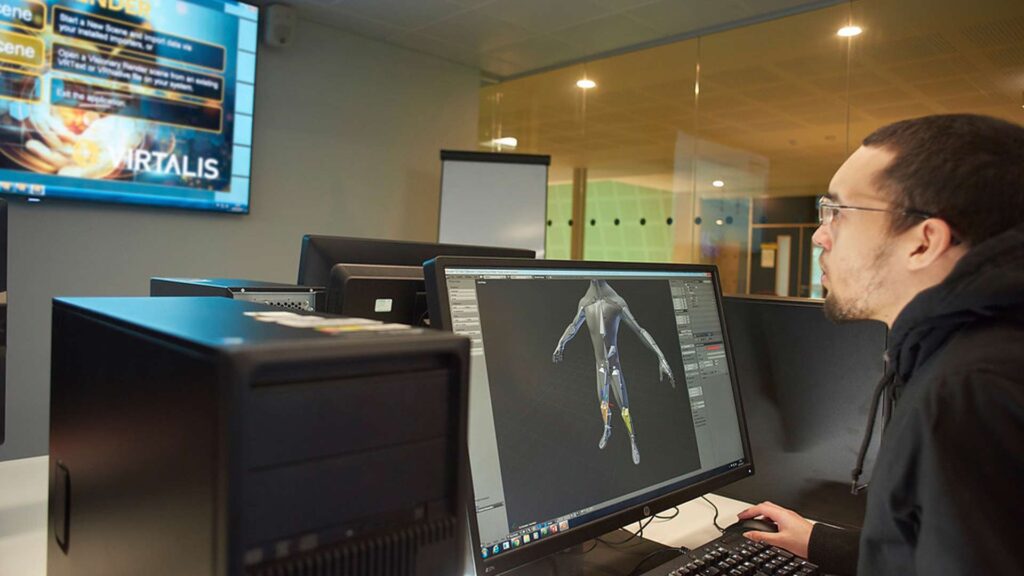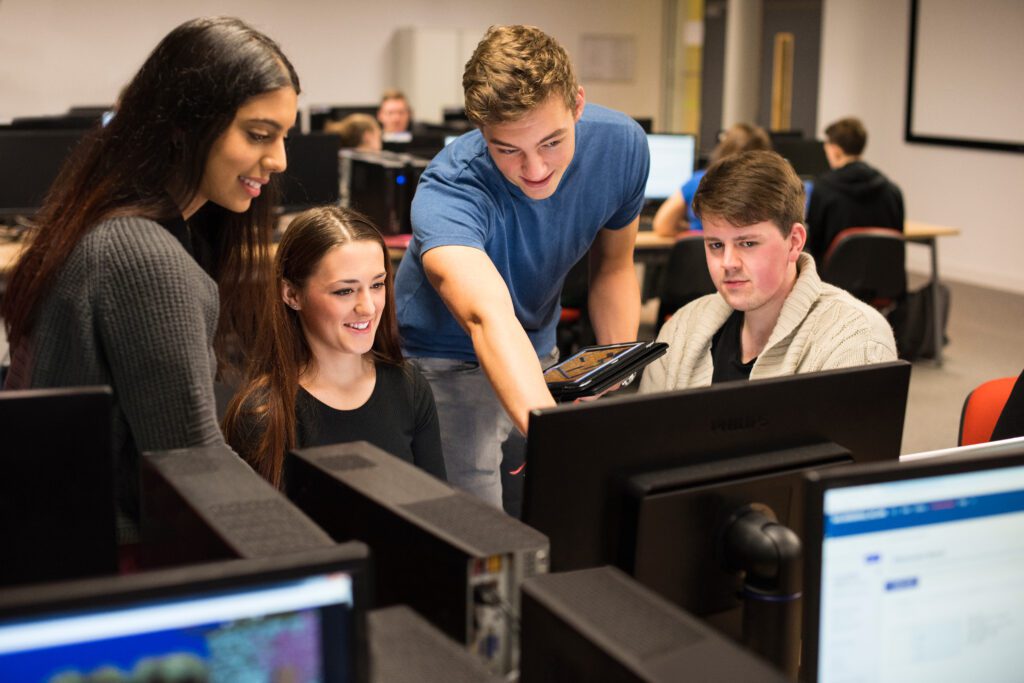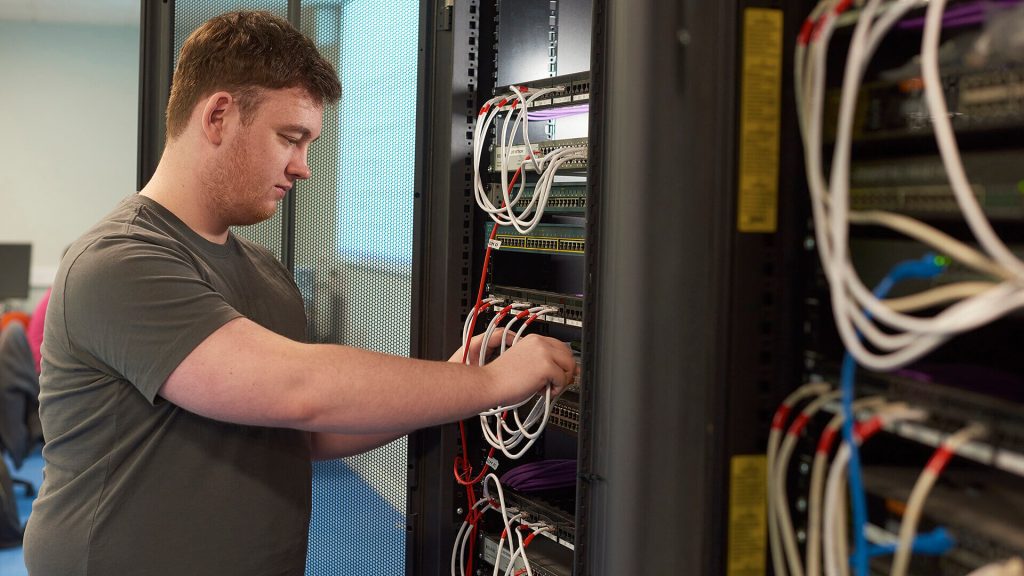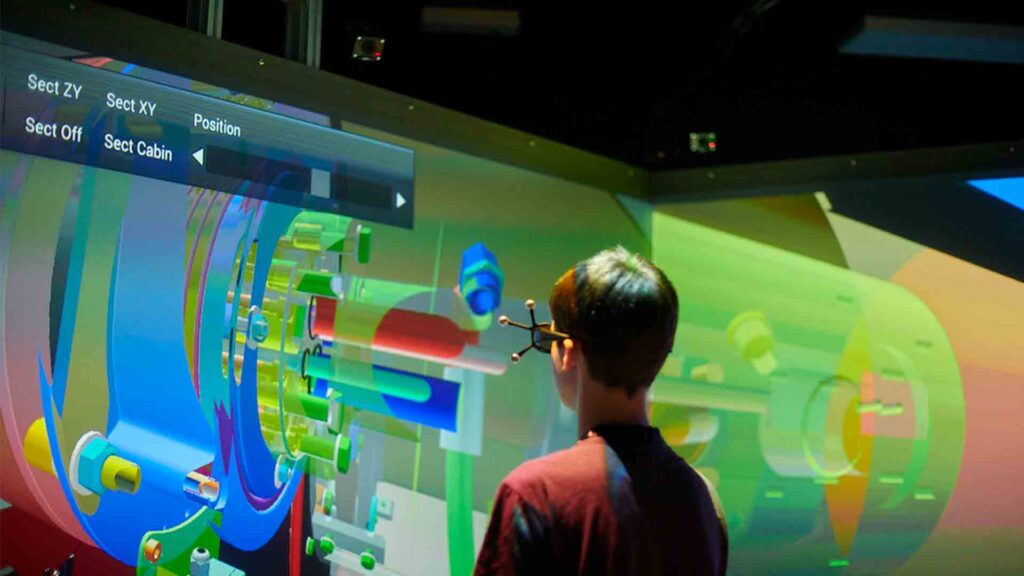Computing BSc (Hons)
UCAS code: G401
Expand your horizons to the whole digital world from gaming, ecommerce and graphics to programming, networks and big data on a computing degree accredited by BCS, The Chartered Institute for IT.
Overview
| Course length: | 3 years full-time Typically 4.5 years part-time |
|---|---|
| Start dates: | September 2025 September 2026 |
| Location: | Edge Hill University (full-time) Edge Hill University (part-time) |
| Example offers: | BCC-BBC (A Level) or DMM (BTEC) View full entry criteria |
| Subject(s): | Computer Science |
| Faculty: | Arts and Sciences |
| Department: | Computer Science |

Business, medicine, education and the arts – every field of human achievement has been revolutionised by the power of computers. You can be part of the next generation pushing the boundaries of what’s possible with our computing degree.
Explore the roots of the digital world and computer science then focus on what interests you most. You could choose modules like games engines, advanced databases systems or biometrics security and identity.
Our £13m Tech Hub is the place to test your knowledge and skills in our modern computing and engineering laboratories, equipped with comprehensive test and measurement equipment, high-specification computers, high-resolution screens and the latest hardware and software. You can turn theory into practice in our virtual reality four-screen CAVE (Computer Augmented Virtual Environment) or on the big data servers.
Your future matters to us. As well as developing specialist expertise, you’ll gain transferable skills in IT and project management that will open the doors to a wide range of careers.
An accredited degree
This course is accredited by BCS, The Chartered Institute for IT, for the purposes of fully meeting the academic requirement for registration as a Chartered IT Professional. Successfully completing an accredited honours degree is the first step to full BCS membership and to being awarded chartered status.
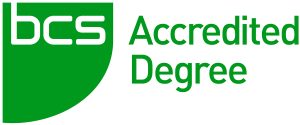 BCS, The Chartered Institute for IT
BCS, The Chartered Institute for IT
Course features
-
International students can apply
-
Learn a language option available
-
Professional accreditation
-
Sandwich year option available
-
Studying abroad option available
-
Work placement opportunity
What you'll study
Start your degree learning the problem-solving skills of a computer scientist. Find out how it all works as you look into the principles, design, structure and key components of digital networks. Study the key ideas, modelling, techniques and processes behind software development. You’ll also learn accessible web design and development to complete the year.
Web coding, computer games or programming – choose from an exciting range of modules in Year 2. Discover the big picture with the Fundamentals of Digital Forensics or Data Analytics. You can also learn to run the show in Project Management. Whichever you choose, you’ll underpin everything with core database studies, security fundamentals and an introduction to e-commerce. Boost your job prospects and consider a year in industry before Year 3.
Year 3 is all about you. Create a blend of modules tailored to your talents. Show us your creativity and originality in a research and development project. Then choose four modules that lean into your strengths. Examples include Information Security or Advanced Databases. Explore biometric security or distributed systems. Consider coaching others or commit to pursuing IT management. Every option opens doors to your future career or studies.
How you'll study
Teaching methods are designed in consultation with leading employers in the region. Many classes are based in computer workshops, focusing on student activity as a means of learning. We introduce theoretical concepts by building on concrete practical activity.
To enhance your employability, you will be given opportunities to work together and develop the essential people skills to complement your technical ability.
How you'll be assessed
You will be assessed through a combination of practical exercises, reports, essays and examinations. We want you to develop the ability to work effectively both independently and as part of a team, therefore assessment includes both of these forms, though the emphasis is strongly on individual work.
Who will be teaching you
You will be taught by staff who are passionate about student learning and development. The programme team are specialists in computing and active researchers in areas including mobile computing, distributed systems, web information architecture, visualisation and applications of problem-based learning in computing and information systems. Academic staff are regular contributors to academic conferences and journals.
Where your course includes optional modules, these are to provide an element of choice within the course curriculum. The availability of optional modules may vary from year to year and will be subject to minimum student numbers being achieved. This means that the availability of specific optional modules cannot be guaranteed. Optional module selection may also be affected by timetabling requirements. Some restrictions on optional module choice or combinations of optional modules may apply.
Entry criteria
Typical offer 104-112 UCAS Tariff points, for which no specific subjects are required, plus GCSE Mathematics at Grade C or Grade 4 or above (or equivalent).
Please note, for all programmes in the Department of Computer Science, a level 2 numeracy qualification is not considered as equivalent to GCSE Grade C or Grade 4 in Mathematics.
Example offers
| Qualification | Requirement |
|---|---|
| A Level | BCC-BBC. |
| BTEC Extended Diploma (or combination of BTEC QCF qualifications) | Distinction, Merit, Merit (DMM). |
| T Level | Overall grade of Merit. |
| International Baccalaureate (IB) | We are happy to accept IB qualifications which achieve the required number of UCAS Tariff points. |
| Access to Higher Education Diploma | 45 credits at Level 3, for example 9 credits at Distinction and 36 credits at Merit or 15 credits at Distinction and 30 credits at Merit. The required total can be attained from various credit combinations. |
Please note, the above examples may differ from actual offers made. A combination of A Level and BTEC awards may also be accepted.
If you have a minimum of two A Levels (or equivalent), there is no maximum number of qualifications that we will accept UCAS points from. This includes additional qualifications such as Extended Project Qualification (EPQ), AS Levels that haven't been continued to A Level, and General Studies AS or A Level awards.
English language requirements
International students require IELTS 6.0, with a score no lower than 5.5 in each individual component, or an equivalent English language qualification.
If your current level of English is half a band, one band, or one-and-a-half bands lower, either overall or in one or two elements, you may want to consider our Pre-Sessional English course.
Fair Entry Criteria
Our new Fair Entry Criteria is a Contextual Admissions Policy that takes an applicant’s personal and educational background into account. This policy will allow eligible applicants to receive up to a two-grade reduction in their entry requirements for this course. Find out more and see if you qualify.
How to apply
Apply full-time
Read our guide to applying through UCAS to find out more about the application process.
International
Please see our international student pages for further information about how to apply as a prospective international student.
Part-time applications require a direct application to Edge Hill. Please select the year of entry that you wish to apply for.
Should you accept an offer of a place to study with us and formally enrol as a student, you will be subject to the provisions of the regulations, rules, codes, conditions and policies which apply to our students. These are available at www.edgehill.ac.uk/studentterms.
If you join a full time undergraduate degree at Edge Hill University, we will guarantee you the offer of a room in our halls of residence for the first year of your course.
Discover our accommodation
Facilities
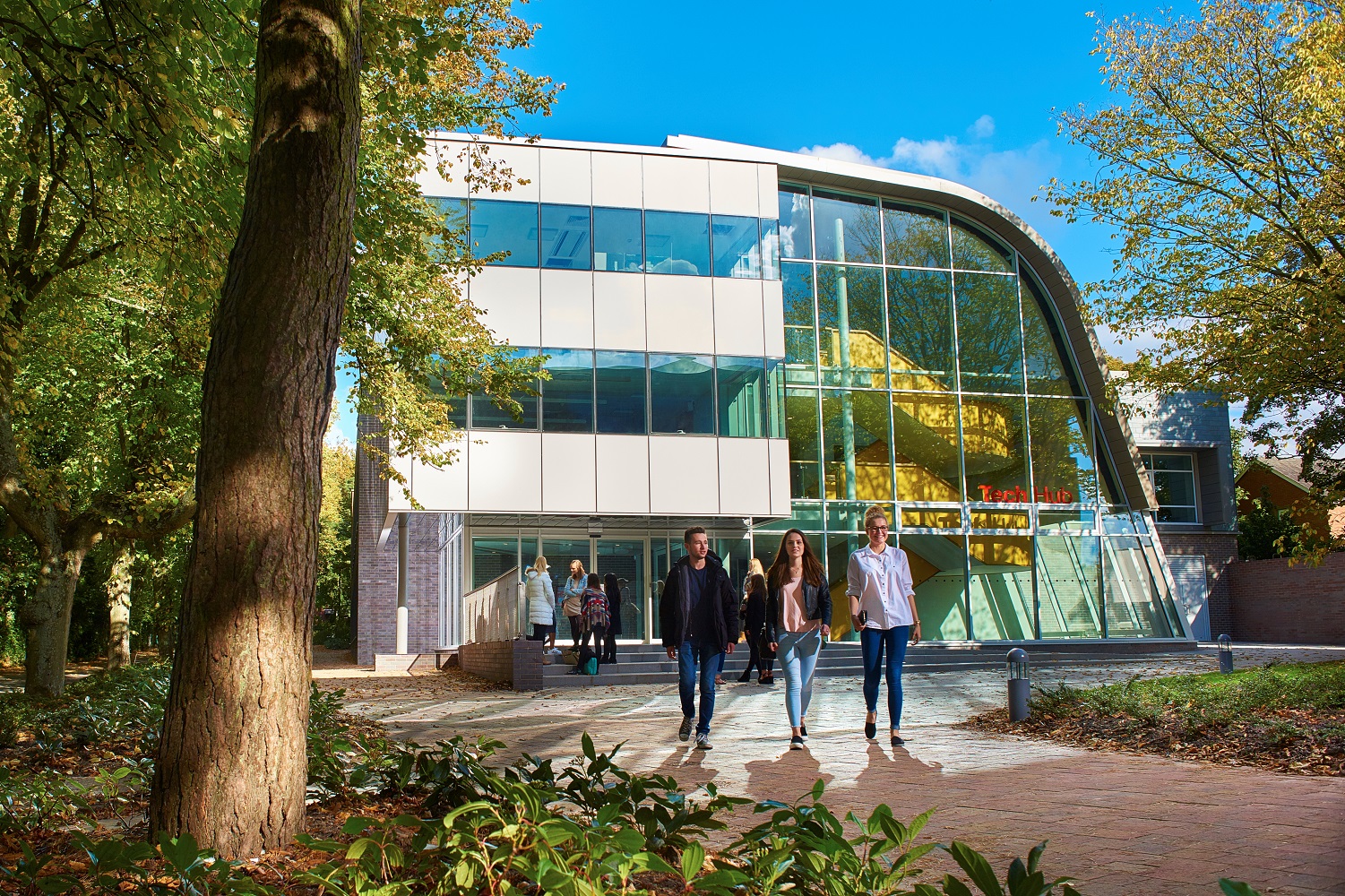 The Department of Computer Science is based in the state-of-the-art £13million Tech Hub. This purpose-built development offers highly contemporary suites of outstanding facilities for Computer Science and Engineering students. Our modern computing and engineering laboratories are equipped with comprehensive test and measurement equipment, high-specification computers, high-resolution screens and the latest hardware and software.
The Department of Computer Science is based in the state-of-the-art £13million Tech Hub. This purpose-built development offers highly contemporary suites of outstanding facilities for Computer Science and Engineering students. Our modern computing and engineering laboratories are equipped with comprehensive test and measurement equipment, high-specification computers, high-resolution screens and the latest hardware and software.
A four-screen CAVE (Computer Augmented Virtual Environment) provides a super immersive 3D virtual environment, enabling users to immerse themselves in a virtual room and experience real life scenarios in 4K resolution. There are also specialist laboratories for networking and games programming, in addition to a specialist research laboratory, open access laboratory and a Harvard style lecture theatre.
Where you'll study
Learning resources
Learning resources include robots and a robotics simulator, wired and wireless networking hardware, graphics software, web development tools, software development environments, big data servers, eye trackers, giant 3D interactive teaching screens, and other specialist software required for studying forensics and internet security techniques.
Finance
Tuition fees
UK Full-Time
£9,535
a year
UK Part-Time
£79 per credit
for 360 credits
International
£17,000
a year
EU/EEA and Swiss students who have settled or pre-settled status under the EU Settlement Scheme, as well as Irish nationals, may be eligible for the UK tuition fee rate.
Financial support
Subject to eligibility, UK students joining this course can apply for a Tuition Fee Loan from the Government to cover the full cost of tuition fees. UK students enrolling on the course may also be eligible to apply for additional maintenance loan funding to help with living costs.
Scholarships
We offer a range of scholarships, which celebrate the determination, commitment and achievement of our students. Many of our scholarships are awarded automatically. There are some however, where you will need to be involved in an application or nomination process. To find out more about our scholarships and check your eligibility, please visit our dedicated scholarships pages.
Money Matters
Please view the relevant Money Matters guide for comprehensive information about the financial support available to eligible UK students, together with details of how to apply for potential funding.
EU/EEA and Swiss students who have settled or pre-settled status under the EU Settlement Scheme may be eligible to apply for financial support. Irish nationals can ordinarily apply to Student Universal Support Ireland (SUSI). If you are an EU student who does not have settled or pre-settled status, or are an international student from a non-EU country, please see our international student finance pages.
Your future career
You can springboard from a computing degree into software development or networking engineering and apply for graduate entry schemes with big names like BAE Systems, AO, Barclays, JD Sports and the Walton Centre.
Many students choose to stay on to pursue a Masters and specialise further. Perhaps you’ll dedicate yourself to an academic career with a Masters of Research.
Some of our students discover a passion for teaching. It is easy to go into post-graduate teacher training from your degree, and we offer a number of PGCE courses at Edge Hill, including our PGCE Secondary Computer Science and IT with QTS course. We have graduates successfully working as primary and secondary school teachers.
Course changes
Every effort has been made to ensure the accuracy of this information, however our courses are subject to ongoing review and development. Changing circumstances may necessitate alteration to, or the cancellation of, courses.
Changes may be necessary to comply with the requirements of professional bodies, revisions to subject benchmarks statements, to keep courses updated and contemporary, or as a result of student feedback. We reserve the right to make variations if we consider such action to be necessary or in the best interests of students.
